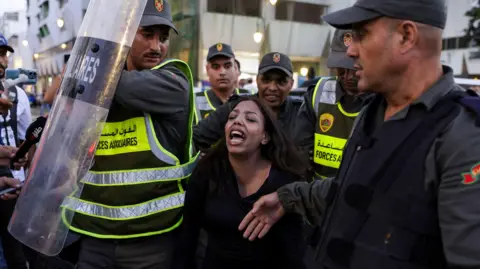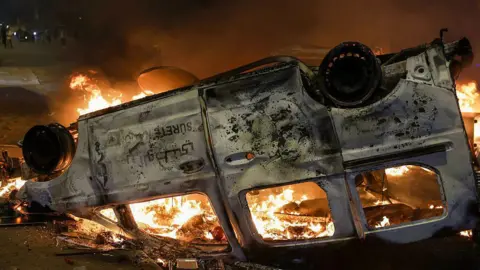Morocco is currently building what will be the globe’s largest football stadium in preparation for co-hosting the 2030 World Cup.
But for the demonstrators who have taken to the streets each night across the country since last Saturday, this 115,000-capacity showpiece and all the other football infrastructure in development, costing a reported $5bn (£3.7bn), are an affront – an example of a government that has got its priorities wrong.
“I am protesting because I want my country to be better. I don’t want to leave Morocco, and I don’t want to resent my country for choosing to stay,” says Hajar Belhassan, a 25-year-old communications manager from Settat, 80km (50 miles) south of Casablanca.
A group called Gen Z 212 – the number is a reference to the country’s international dialling code – has been coordinating the demonstrations through the gaming and streaming platform Discord, as well as TikTok and Instagram.
Apparently taking inspiration from Nepal’s recent Gen Z protests, the young Moroccans want the authorities to act with the same urgency and passion when it comes to addressing these issues as with hosting one of the world’s premier sporting events.
Starting on 27 September with protests across 10 cities, the crowds have been building through the week, chanting slogans such as: “No World Cup, health comes first” and “We want hospitals not football stadiums”.
The police have responded with seemingly arbitrary mass arrests and in certain places things have turned violent, leading to the death of three protesters.
Prime Minister Aziz Akhannouch said on Thursday that he was open to dialogue, but the leaderless movement has vowed to keep going until there is concrete change.
A list of their demands has been shared on social media. They include:
- Free and quality education for all
- Accessible public healthcare for everyone
- Decent and affordable housing
- Better public transport
- Lower prices and subsidise basic goods
- Improve wages and pensions
- Provide job opportunities for youth and reduce unemployment
- Adopt English as the second language instead of French (after Arabic)
Anger had been growing, but what galvanised the movement was the death over a number of days in mid-September of eight women in a maternity ward of a hospital in the southern city of Agadir. There were some reports that the deaths could have been prevented if there had been better care, proper equipment and enough medical staff.
In 2023, it was estimated that there were 7.8 doctors per 10,000 Moroccans, way below the World Health Organization recommendation of 23 per 10,000.
Having read about the protests on social media and inspired by a friend, Ms Belhassan decided to join on Monday.
The day before, that friend had been sending her videos from a demonstration in Casablanca that she was taking part in and Ms Belhassan was immediately uploading them onto her social media accounts.

Then, her friend called to say her brother had been arrested. He was not released until the early hours of the following morning. This, Ms Belhassan says, is what pushed her to go out on to the streets.
“We are making reasonable, basic demands. Health and education are necessities that should already be prioritised,” she tells the BBC in a passionate voice.
“It breaks my heart to see young, educated and peaceful people faced with arbitrary arrests.”
When Ms Belhassan went out she noticed that the police were trying to stop people gathering and were making arrests.
She says she was scared of making eye contact with officers in case she attracted their attention.
“I was afraid for my safety but I still went out,” she says.
On Wednesday, interior ministry spokesman Rachid El Khalfi said that 409 people had been detained up to that point.
He also announced in a press release that 260 police officers and 20 protesters had been injured and 40 police vehicles and 20 private cars were torched in violent clashes.
Twenty-three-year-old Hakim (not his real name) was one of those arrested.
He says he went out onto the streets of Casablanca to protest peacefully but ended up in a police cell with around 40 people.
“This government has been abusing their power too much,” Hakim says. “My father had a stroke a little while ago. If we didn’t have some savings to get him treated in a private hospital he would’ve died. What am I gaining from a country that is not providing healthcare for my ageing parents or educating me?”
He describes the state-funded education system as being “far behind” what is available in the private sector.
“We deserve a dignified life,” says Hakim. “We want to host the Fifa World Cup, but we want to do that with our heads up high, not while hiding behind a façade.”

The police response has been heavily criticised by several Moroccan human rights organisations, protesters and the opposition.
The Gen Z 212 protests are not the first time that young Moroccans have taken to the streets.
Many commenters online have been drawing parallels with the country’s violent 1981 riots, where those who died became known as the Bread Martyrs as they were protesting against the soaring price of basic foods. A 2004 commission appointed by the king to investigate the country’s past human rights abuses verified 114 deaths but did not disclose how exactly they died. Reparations were then made to victims of human rights abuses and families of deceased ones.
The country has seen other youth-led movements, notably in 2011 and 2016.
The events of 2011 were part of the larger Arab Spring and led to reform of the constitution through a national referendum called by King Mohamed VI.
For the first time in Moroccan history, the monarch strengthened the role of the government by ceding executive power to the prime minister and parliament. The king remains the legitimate head of state, military and religious affairs, holding the power to appoint and remove ministers if necessary.
What makes Gen Z 212 different is that those demonstrating say they are not tied to a political party and do not appear to have a formal structure.
“We are not a political movement. We have no leader,” Ms Belhassan says.
“Maybe that’s why the police were arresting people, and why the government kept silent – because, in their eyes, we didn’t follow the traditional path of organisations and political parties.”
But there is some disquiet about the violence.
On the night of 1 October, three protesters died in the town of Lqliaa after people attempted to storm a police station. The local authorities said security forces opened fire after protesters tried to start a fire and steal weapons from the station, then subsequently released supporting CCTV footage to disprove emerging false narratives online.
Protesters have condemned the rioting and looting that have happened in certain areas and have organised clean-up groups. They have also repeatedly called for peace and dialogue, but it seems they are not convinced by the prime minister’s apparent willingness to talk.
On Friday, calls began to emerge for the king to dissolve the government. That may be a step too far, but the protesters do not seem to be in the mood to pull back.
Looking ahead to 2030, protester Ms Belhassan says that “of course” Moroccans are “excited to host the World Cup”.
“We love football, it is in our blood. But we are missing the foundations. Sure, let’s build stadiums, but let’s also build our education and health systems. Let’s take care of our people.”
Source: BBC

















